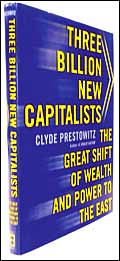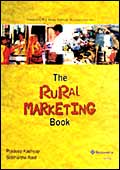 |
THREE BILLION NEW CAPITALISTS
By Clyde Prestowitz
Basic Books
PP: 321
Price: Rs 675 |
It's
the world's largest economy, still the seat of research and innovation
and, despite a growing resentment against it, pretty much the
global cultural trendsetter. So why should America worry over
a few thousand jobs moving to India, and China's export engine
continuing to hum louder? Because, says Clyde Prestowitz, President
of the Economic Strategy Institute in Washington, D.C., the writing
is on the wall. America's pre-eminent position is under threat,
and the US government does not seem to have a strategy to counter
it. Prestowitz, author of two other books, Trading Places and
Rogue Nation, points to some obvious concerns that American policy-makers
are turning a blind eye to. For example, the soaring trade deficit
($650 billion in 2004), the pressure on dollar, and America's
declining output in education and R&D. In contrast, he says,
China, India and Russia have not just cast off their socialist
yoke, but hit the capitalist road with a vengeance.
Prestowitz, a trade official in the Reagan
administration, doesn't say anything radically new in this book.
China's phenomenal rise-and the resultant threat to the US- has
been well documented. But where he excels is in joining the dots
and explaining the phenomenon in a narrative that's both lucid
and compelling. It is easy to mistake Prestowitz for an alarmist,
but his is really a cry for action. Citing a story from the Washington
Post, he says "without some combination of special skills,
higher education, and professional certification, (the average
American worker) will be in danger of sliding down the ladder
to low-paying service jobs with...no future".
So should you buy this book? If I were an
American parent, I would be buying my back-to-college kid this
fall a copy of Three Billion New Capitalists, and not a Toshiba
portable computer. But even if you are an Indian parent, manager
or a policy maker, you should be reading this book because in
America's paranoia there's an important message for all of us.
Fix it, even if it ain't broke.
Corrigendum: Under
the thumb-sized photo of Strategy Safari in Bookend dated September
11, 2005, the authors were inadvertently mentioned as Mukul Pandya
and Robbie Shell. They should have been Henry Mintzberg, Bruce
Ahlstrand, and Joseph Lampel. The publisher is Pearson and not
Wharton School Publishing.
 |
THE RURAL MARKETING BOOK
By Pradeep Kashyap and Siddhartha Raut
Biztantra
PP: 380
Price: Rs 449 |
INDIA UNLIMITED
You
can call it the Kotler of 'rural Marketing' in India, if you want,
but The Rural Marketing Book is actually a textbook on everything
that you wanted to know about India's rural markets: right from
what defines a rural market, consumer demographics and psychographics,
down to real-life case studies on all the marketing 'Ps', product,
price, place and promotion.
Long-time rural market evangelists, authors
Pradeep Kashyap and Siddhartha Raut have managed to pack in quite
a bit of data on rural infrastructure, market dynamics, and media
to make the book relevant for not just management students but
even big company executives trying to navigate a marketplace comprising
742 million consumers. The book even delves into all hues of rural
finance-organised, unorganised, micro-credit, kisan credit card,
chit funds etc.
The book, whose foreword is written by former
HLL chairman M.S. Banga, is certainly not a weekend read. It is
more text-bookish in tone and tenor (although that's no reason
why the product |

